The Japan Lecture Series invites established and emerging voices from all areas of Japan Studies to share their latest projects with our community. To promote accessibility, many of the lectures will take a hybrid format. Sessions will entail a forty-five-minute lecture followed by a thirty-minute question-and-answer period.
Hosted by the Department of Asian Studies, University of British Columbia, this is a recurring event that is open to the public.
Should you have any questions, please contact Christina Yi at christina.yi@ubc.ca.
Upcoming events:
“Questioning, ‘What Am I?’” by Hirano Keiichiro
Monday, March 18 from 1:00pm – 2:45pm Pacific Time
In-person in the Asian Centre Auditorium (map here)
Registration link: https://www.eventbrite.ca/e/north-american-japanese-literature-forum-in-vancouver-tickets-839139006357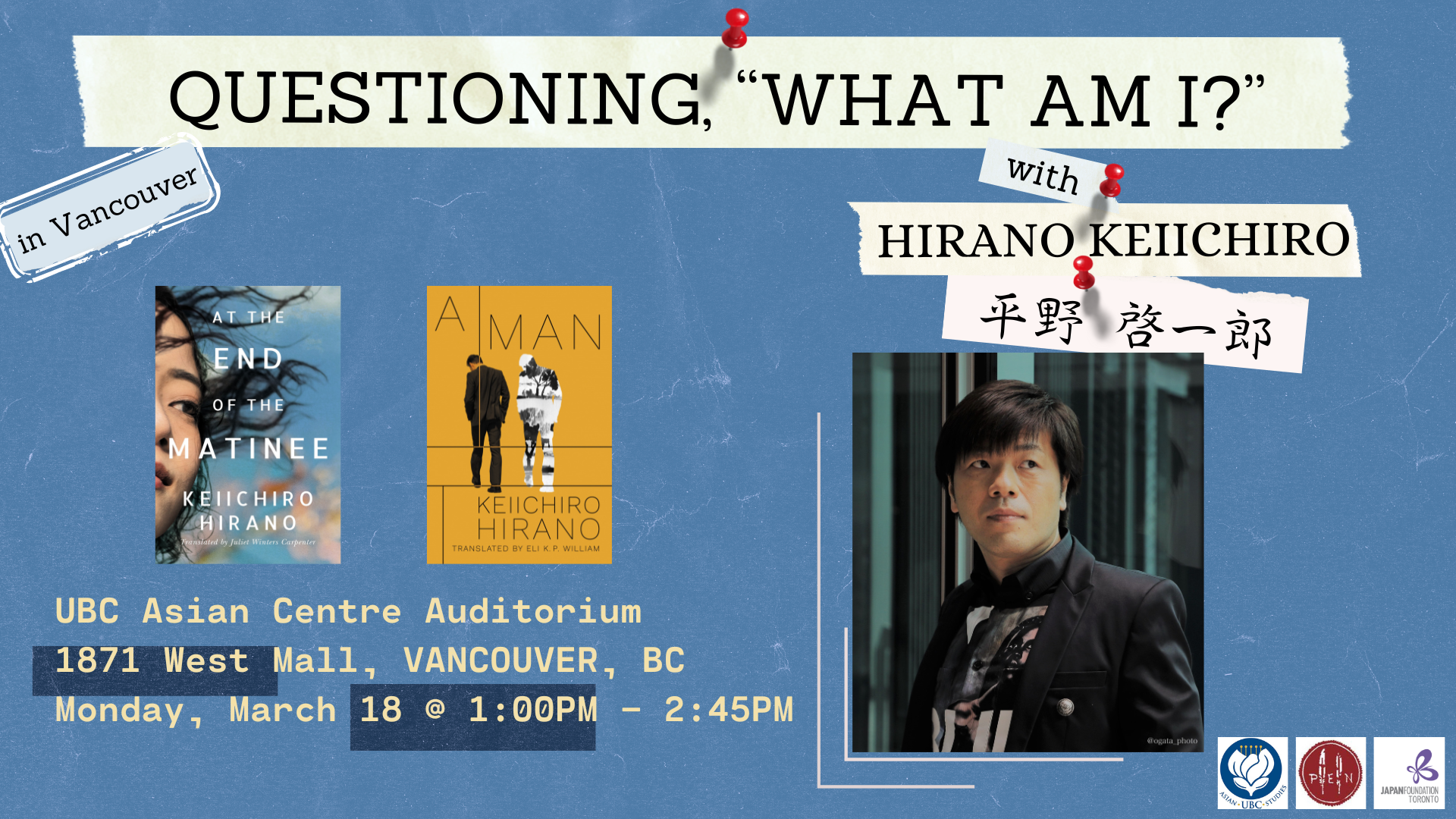

HIRANO Keiichiro is an award-winning author from Japan whose novels translated into English include A Man and At the End of the Matinee. In this talk, he will share his personal experiences as a writer of Japan’s “Lost Generation,” defined as a generation whose socio-economic stability declined dramatically following the collapse of the country’s asset price bubble. Mr. Hirano will also discuss the characteristics of writers of the generation before and after him, delve into the question of identity, and as a current member of the Akutagawa Prize selection committee, touch upon recent trends in Japanese literature. Also participating will be Professor Ayako Sato (Meiji Gakuin University), who will speak on the role of the Japan P.E.N. Club.
For more information, please visit the following website: https://tr.jpf.go.jp/event/hirano-keiichiro-in-vancouver/
Co-presented by Japan P.E.N. Club, UBC Asian Studies, and The Japan Foundation, Toronto.
Speaker
Hirano Keiichiro has written more than 15 novels since his debut work The Eclipse, for which he won the prestigious Akutagawa Prize at the record age of 23. His deeply psychological fiction deals with profound and universal themes like self-love, relationships, and acceptance, and spans from short stories and historical novels to essays, love stories, and literary sci-fi. His novel At the End of the Matinee was a runaway bestseller in Japan and released as a movie in November 2019. In 2023, he published his 20-years-long work Theory on Mishima Yukio.
Coordinator
Ayako Sato is Professor Emerita at Meiji Gakuin University, a prolific translator, President of The Canadian Literary Society of Japan, and Executive Director of Japan PEN. She specializes in Canadian Literature and American Literature. Her translations include Margaret Atwood’s The Robber Bride, Alias Grace, Payback: Debt and the Shadow Side of Wealth, and The Year of the Flood as well as Tomson Highway’s Dry Lips Oughta Move to Kapuskasing. She is a co-author of J.D. Salinger Bungaku no Kenkyu, Kebekku o shiru tame no 54 sho, and Kanada o tabi suru 37 sho.
Online Book Talk by Matthieu Felt (University of Florida), Meanings of Antiquity
Friday, February 9 at 4:00pm – 5:30pm Pacific Time
Online via Zoom.
This talk discusses the 2023 book Meanings of Antiquity, the first dedicated study of how the oldest Japanese myths, recorded in the eighth-century texts Kojiki and Nihon shoki, changed in meaning and significance between 800 and 1800 CE. Generations of Japanese scholars and students have turned to these two texts and their creation myths to understand what it means to be Japanese and where Japan fits into the world order. As the shape and scape of the world explained by these myths changed, the myths themselves evolved in turn. Over the course of the millennium covered in this study, Japan transforms from the center of a proud empire to a millet seed at the edge of the Buddhist world, from the last vestige of China’s glorious Zhou Dynasty to an archipelago on a spherical globe. Analyzing historical records, poetry, fiction, religious writings, military epics, political treatises, and textual commentary, Matthieu Felt identifies the geographical, cosmological, epistemological, and semiotic changes that led to new adaptations of Japanese myths. Felt demonstrates that the meanings of Japanese antiquity and of Japan’s most ancient texts were – and are – a work in progress, a collective effort of writers and thinkers over the past 1300 years.
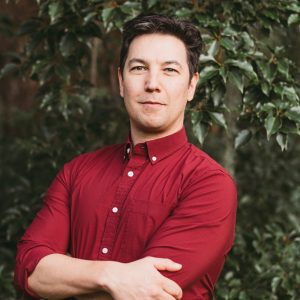

Why Play This Way?—Examining Approaches to Premodern Games via Heian-period Uta-awase
Tuesday, January 23 at 12:00pm – 1:30pm Pacific Time
Now online via Zoom. Please email ubcjapanlectures@gmail.com to request the access link.
In the early 2000s, game studies underwent an energetic period of innovation and discussion, driven largely by the explosion of digital games that continues to the present. However, these new theories have largely been applied to digital games or non-digital games still in play today—but what of games from premodern periods? One such game is the Japanese tradition of uta-awase (Poetry Matches), in which teams presented poems to compete head-to-head for adjudication on which side had the better poems. In this talk, Kurtis will explore and explain the approach to understanding games that has informed the methodology in his dissertation. Using C. Thi Nguyen’s concept of striving play and temporary agency taken on by the players of a game, the talk will examine how this framework helps explain several uta-awase that break the mold in Japan’s Heian period (794–1185) and illuminate why they were played the way they were.
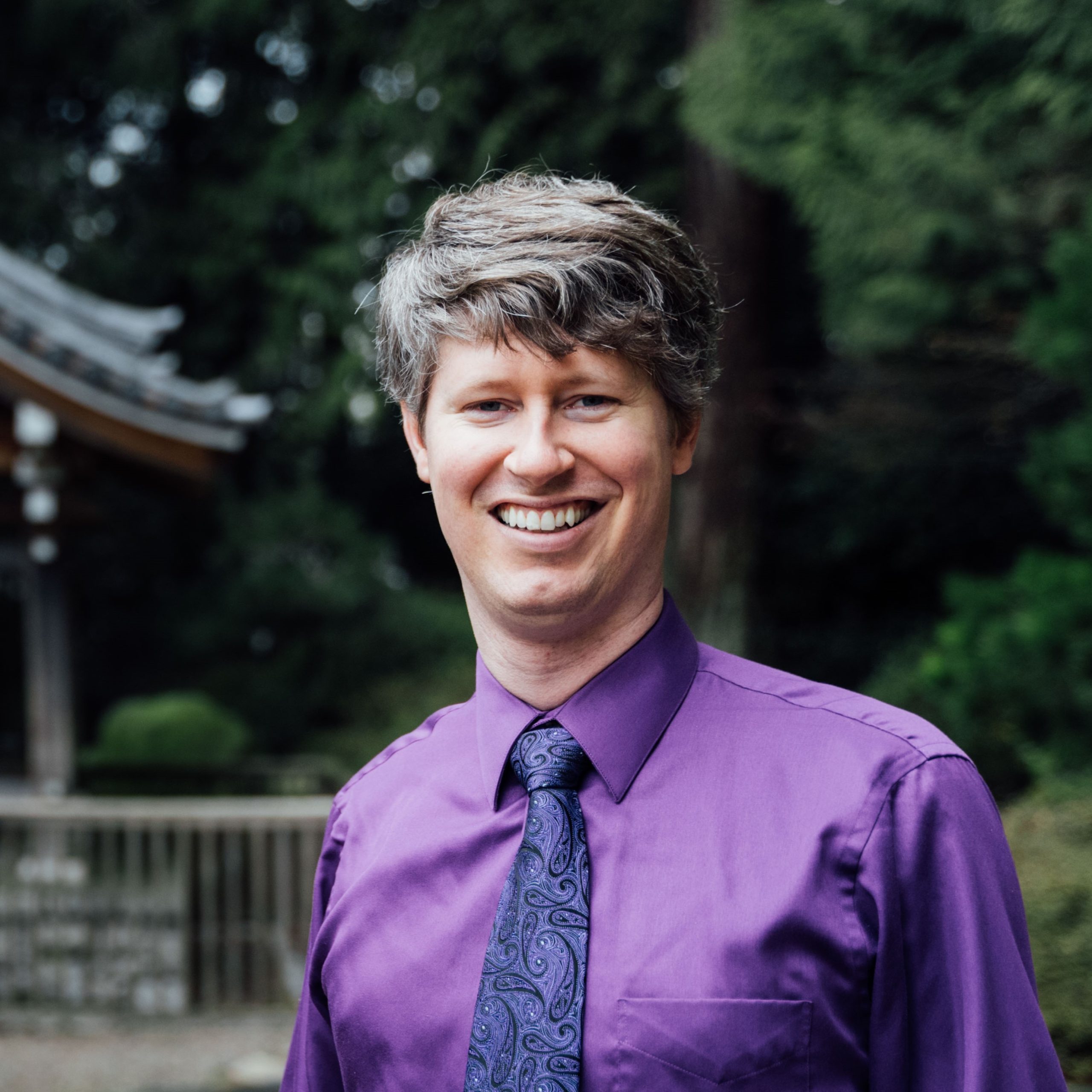

Symposium on Zainichi Korean Literature
Saturday, December 9 from 2:00pm – 5:45pm Pacific Time
This event will be a special symposium on the topic of translating Zainichi (lit. “residing in Japan”; resident) Korean literature, to be held as a hybrid session.
For more information, please visit the symposium website below:
Michiko Suzuki (UC Davis): Reading the Kimono in Twentieth-Century Japanese Literature and Film
Friday, November 10 from 4:00pm – 5:30pm Pacific Time
Online via Zoom
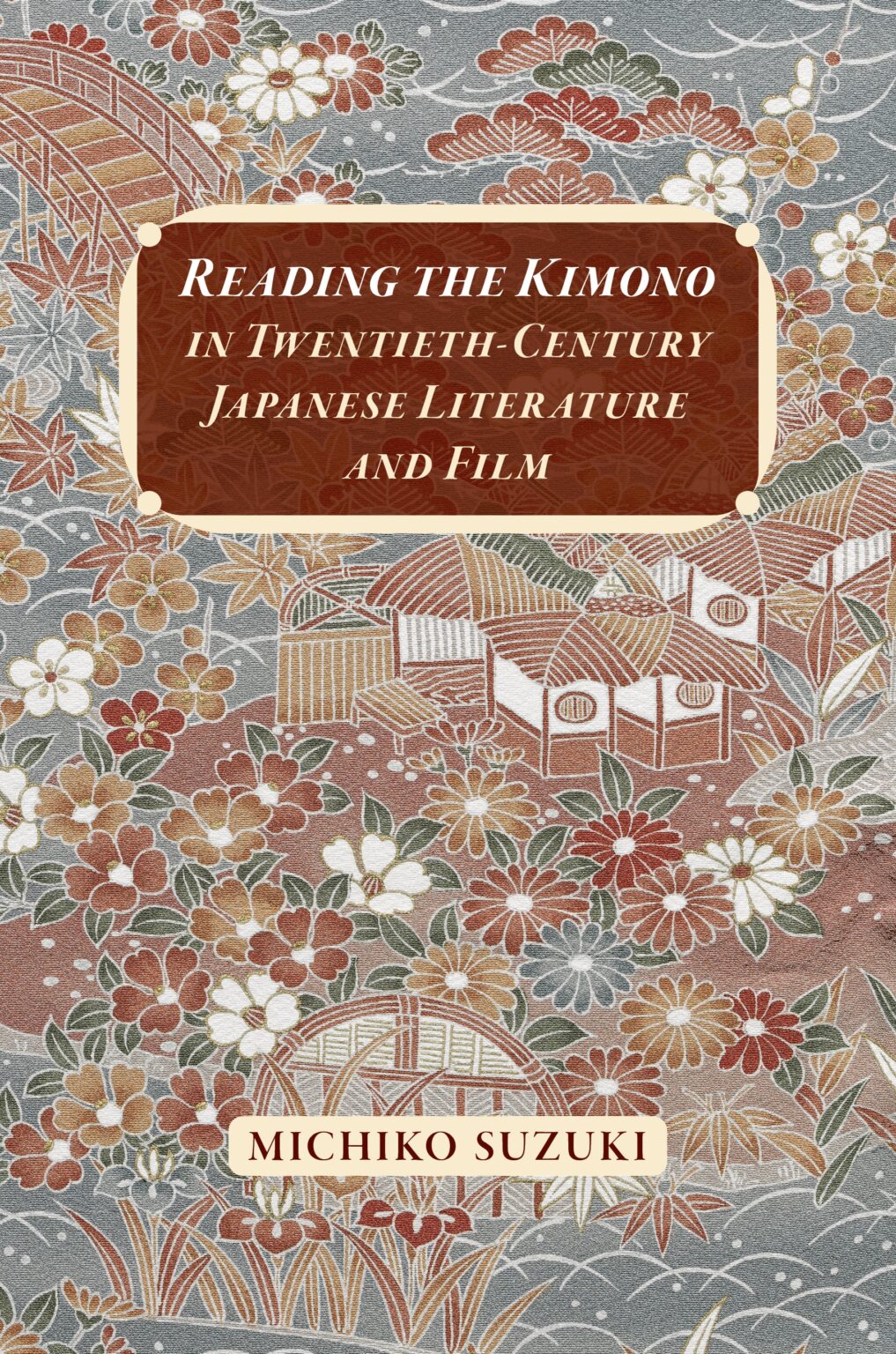

Michiko Suzuki is associate professor of Japanese and comparative literature at the University of California, Davis. Her work examines narratives in light of cultural discourses and historical contexts and focuses on issues including modernity, sexuality, sexology, women writers, and kimono culture. She is the author of Reading the Kimono in Twentieth-Century Japanese Literature and Film (University of Hawai‘i Press) and Becoming Modern Women: Love and Female Identity in Prewar Japanese Literature and Culture (Stanford University Press). Currently, she is working on several projects, including an exploration of contemporary Japanese women writers and the so-called modern literary canon.
Professional Development Workshop by Dr. Fuyubi Nakamura: Using Japanese Visual Materials
Friday, October 20, 1:00 – 2:30pm Pacific Time
In-person in Room 604 (seminar room) @ UBC Asian Centre, 1871 West Mall, Vancouver (map here)
This workshop will introduce you to how to use visual materials including artworks, manga, photographs and films for presentation and publication. The topics will include copyright issues, obtaining permission to reproduce images, and preparing images. The implications of the use of visual materials in research will also be considered. Note: this workshop will be in-person only.
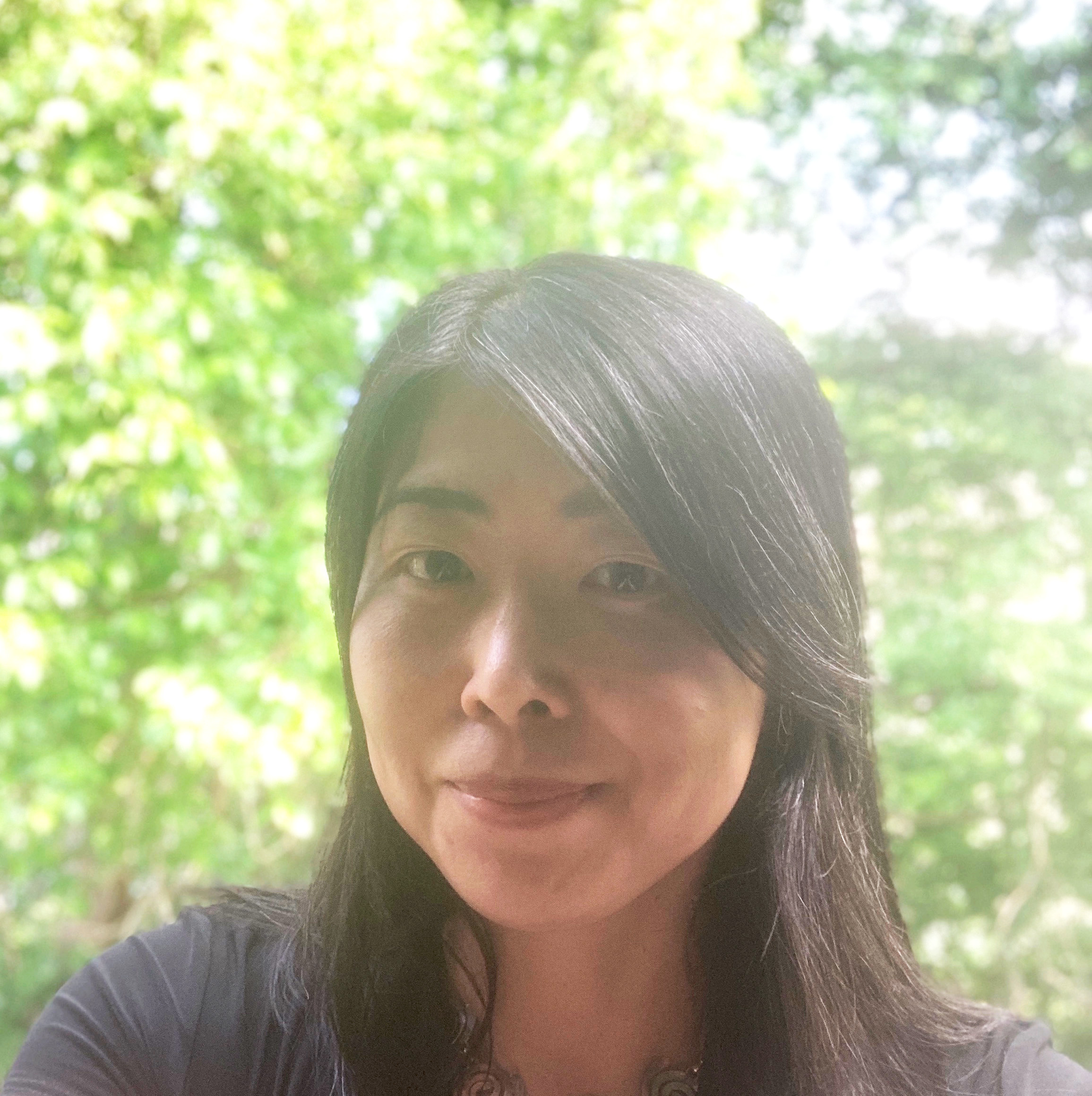

Ayaka Yoshimizu: Doing Ethnography in the Wake of the Displacement of Transnational Sex Workers in Yokohama
Wednesday September 20, 12:00 – 1:30 PM (PT)
Auditorium, UBC Asian Centre, 1871 West Mall, Vancouver (map here) and online via Zoom
Guest Speakers: Dr. Ayaka Yoshimizu, Assistant Professor of Teaching, Department of Asian Studies UBC and Dr. Kirsten Emiko McAllister, Professor in the School of Communication at Simon Fraser University.
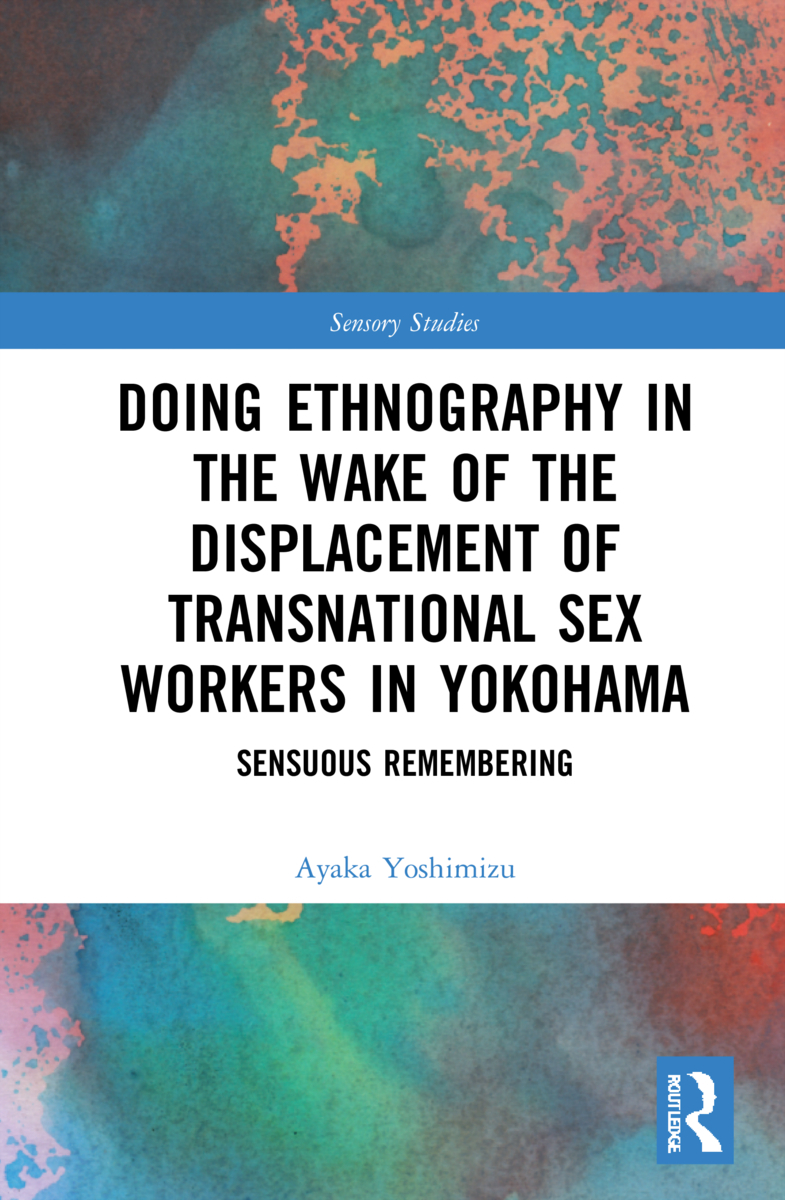

Doing Ethnography in the Wake of the Displacement of Transnational Sex Workers in Yokohama
Doing Ethnography in the Wake of the Displacement of Transnational Sex Workers in Yokohama reflects on the politics, poetics, and ethics of remembering the lives of transnational migrant sex workers in Japan. Drawing on ethnographic fieldwork in the port city of Yokohama, the book focuses on the “water trade” in the Koganecho neighbourhood where exploitative and stigmatised labour took place, involving sexual services performed by migrant women. In recent years the city has sought to rebrand Koganecho, evicting transnational migrant sex workers who had been integral to postindustrial development and erasing their past presence. The author explores Yokohama’s memoryscapes in the aftermath of displacement through embodied knowledge, engaging her senses and ethics as a colonizer-researcher as she navigates the elusive past through traces that remain in the present. She examines the city’s built environment, official historical narratives, films, and photographic works. With few brothels and workers remaining, Yoshimizu fills the gap with her own interactions, encounters, and imaginings. Yoshimizu also writes through the imagery of water in ways that are informed by the local usage and imaginations—the ocean, flowing rivers, swamps, humidity, alcohol, the fluidity of relationships, and transient lives. The water also offers a way to sense the “ghost”, or the displaced lives and the effects of displacement, that, like humid air, stick to those who occupy or inhabit the site of displacement today.
Archive, Text, and Geospatial Data: Three Views of Japanese Shipping in the Pacific in the 1930s
Wednesday April 5, 12:00 – 1:30 PM (PT)
Room 604 (seminar room), UBC Asian Centre, 1871 West Mall, Vancouver (map here) and online via Zoom
Guest Speaker: Dr. Elijah Greenstein, Honorary Research Associate, Centre for Japanese Research, IAR
The 1930s saw the high tide of imperial Japan's expansion in world oceans. While this period is strongly associated with Japan's imperial expansion in continental Asia, the decade also saw Japanese shipping firms rapidly recover from the Great Depression and develop an expanding array of shipping services in the Pacific Ocean and beyond. In the past, a combination of company histories (shashi), diplomatic archives, and newspaper articles made it possible for scholars to examine the business decisions and government policies that propelled these shipping activities. Recent years, however, have seen a growing investment in digital repositories of Japanese texts and other archival materials. In this presentation, I reflect on the potential of this wealth (and even, overabundance) of data to transform how historians engage with archives in Japan. In particular, I will discuss how I used a combination of archival documents and digital methods (including text mining and GIS analysis) to develop new views on the kinds of expansionary projects at sea that paralleled Japanese empire building on land.
Naoko Kato, Kaleidoscope: The Uchiyama Bookstore and its Sino-Japanese Visionaries
Wednesday April 12, 12:00 – 1:30 PM (PT)
Room 604 (seminar room), UBC Asian Centre, 1871 West Mall, Vancouver (map here) and online via Zoom
Guest Speaker: Naoko Kato, independent scholar
Learn more about the speaker: Naoko Kato is scholar-in-residence at the University of Victoria for Past Wrongs and Future Choices (Spring, 2023). She teaches East Asian history at St. Mark’s College and is an information resources specialist for the North American Coordinating Council for Japanese Library Resources. Formerly she was the Japanese-language librarian at UBC Library, where she developed Meiji-related digital teaching resources. Her publications include a chapter in Translating the Occupation: The Japanese Invasion of China, 1937-1945 (UBC Press, 2021).
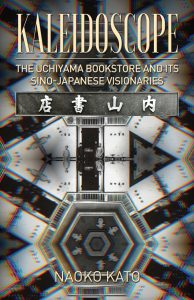

Kaleidoscope
In the 1920s, a Japanese businessman set up a bookshop in the city of Shanghai which changed the course of history by providing a forum for Chinese and Japanese intellectuals to meet and discuss the great issues of the day. Now, Naoko Kato’s powerful book Kaleidoscope looks at the story of Uchiyama Kanzo and his bookstore from a fresh perspective, breaking it down into a series of reflections that shift as the years turn. Uchiyama’s bookstore was a fulcrum of Sino-Japanese contacts, many of the members of Uchiyama’s salon were intellectuals behind the Chinese Communist Party, then an illegal organization in Shanghai. The ability of Uchiyama and his bookstore to transcend intellectual divisions and borders makes his story of unique inter-cultural interest. And the context of Uchiyama’s efforts to bring peace between his home country of Japan and his chosen home of China is one of the most intellectually uplifting stories of the 20th century.
From Place Names to Utamakura through the Lens of “Yoshino”
Monday March 27, 2023, 12:00 – 1:30 PM (PT)
Room 604 (seminar room), UBC Asian Centre, 1871 West Mall, Vancouver (map here)
Host: Dr. Christina Laffin, Associate Professor of Classical Japanese in the Department of Asian Studies, University of British Columbia
Guest Speaker: Yumiko Watanabe, Professor of Medieval Japanese Literature in the Department of Literature at Rissho University
Yumiko Watanabe is a Professor of Medieval Japanese Literature in the Department of Literature at Rissho University who researches Japanese poetry and poetics, waka treatises, and visual culture. Her most recent publications include a collaboratively edited annotation and analysis of the One Hundred Poets, One Poem Each (Hyakunin isshu no genzai, Seikansha, 2022), a coedited collection on private poetry collections as ego documents (Shikashū: waka to jikokatari, Koten Raiburarī, 2021), and a translated and annotated selection of the poems of Fujiwara no Shunzei (Kasama Shoin, 2018). Her monographs consider waka and authority in material culture and the expressive style in the ShinKokin era. Dr. Watanabe has also produced a complete translation and annotation of the Saishō Shitennō-in screen poems which won the 2008 Sekine Prize for the study of classical Japanese literature. In 2022 she contributed to the Suntory Museum summer exhibition on utamakura and material culture, research from which will draw for this lecture.
Today, for many in Japan the place name “Yoshino” brings to mind the image of cherry blossoms. The concept of connecting place name with landscape originates in the tradition of utamakura (poetic toponyms; literally, “poem pillows”). Utamakura emerged within the world of waka (Japanese poetry) eleven thousand years ago, in the latter half of the ninth century, and continued to develop alongside a deep connection to paintings. Early in the medieval period, Retired Emperor Toba (1103–1156) commanded famous places from throughout Japan to be painted on all of the sliding doors (known as shōji) of his Saishō Shitennō-in palace. Poets were then commissioned to compose poetry based on these famous sites.
Later, with shifting social conditions, physical mobility increased, resulting an increase in travel literature (kikōbun) that recorded actual visits to the sites of poetic toponyms (utamakura).
In this lecture, I will focus on the example of “Yoshino” as we trace the origins, development, and transformation in the function of this utamakura.
Japan-educated Korean Christian Elites in Colonial and Post-Colonial Korea
Wednesday March 1, 2023, 12:00 – 1:30 PM (PT)
Room 604 (seminar room), UBC Asian Centre, 1871 West Mall, Vancouver (map here)
Guest Speaker: Dr. Matsutani Motokazu (Tohoku Gakuin University), Visiting Associate Professor of Modern History of Korea and Japan in the Department of Asian Studies, University of British Columbia
Rabbit Holes, Wormholes, and Black Holes: Translating the Science Fiction of Izumi Suzuki
Thursday March 2, 2023, 12:00 – 1:30 PM (PT)
Room 316 (Boardroom), Liu Institute for Global Issues, 6476 NW Marine Drive, Vancouver (map here)
Guest Speaker: Dr. David Boyd, Assistant Professor of Japanese in the Department of Languages and Culture Studies, University of North Carolina at Charlotte
Izumi Suzuki was born in Shizuoka in 1949 and came of age during the sixties. After working for a short time as a keypunch operator, she moved on to acting, modeling, and writing. By the early seventies, Suzuki had carved out a space for herself in Japan’s male-dominated science fiction scene, writing stories that were often set in strange worlds but explored deeply domestic themes.
Terminal Boredom, the first collection of Suzuki’s work to appear in English, was published by Verso Books in 2021. This year, Verso is publishing Suzuki’s second collection of stories: Hit Parade of Tears. In this talk, David Boyd will focus on one of his contributions to this eleven-story volume, “Hey, It’s A Love Psychedelic!” (Nanto, koi no saikederikku!; 1982). He will discuss the translation process in detail, from first read to final draft, paying particular attention to the “rabbit holes,” “wormholes,” and “black holes” that emerged while translating Suzuki’s frenetic fiction.
Surviving Queer: A Reading of Shinkurōdo monogatari
Wednesday February 1, 2023, 12:00 – 1:30 PM (PT)
Room 604 (seminar room), UBC Asian Centre, 1871 West Mall, Vancouver (map here) and online via Zoom
Guest Speaker: Dr. Kimura Saeko, Professor, Department of International Cooperation and Multicultural Studies, the College of Liberal Arts at Tsuda University
Shinkurōdo monogatari (The New Chamberlain) is an illustrated scroll produced in the Muromachi period (1336–1573) which was painted by women for their own amusement. The story depicts a girl who wishes to become a man and who enters court society as a man, thus suggesting it was the dream of girls to become men in order to walk around freely. In this presentation I will read Shinkurodo monogatari as a text revealing forms of freedom as a woman and as a queer woman.
“The Contributions of Religions to Modern Japanese Identity”
Wednesday February 15, 2023 12:00 – 1:30 PM (PT)
Room 604 (seminar room), UBC Asian Centre, 1871 West Mall, Vancouver (map here) and online via Zoom
Guest Speaker: Dr. Peter Nosco, Professor of Japanese History and Culture in the Department of Asian Studies, University of British Columbia
A report on a recent special issue of Japanese Journal of Religious Studies (48:2) into the contributions of religions and religious ideas to the construction of both individual and collective identity in Japan since 1940.
Japanese Cinema and the Video Essay
Wednesday January 18, 2023, 12:00 – 1:30 PM (PT)
Room 604 (seminar room), UBC Asian Centre, 1871 West Mall, Vancouver (map here)
Guest Speaker: Dr. Colleen Laird, Assistant Professor of Japanese Popular Culture in the Department of Asian Studies, University of British Columbia
“Although some scholars have been practicing videographic criticism for over twenty years and many of the pioneers of the form worked with actual film in the pre-digital age, videographic scholarship is an as-yet emerging form in film, media, and digital humanities studies. In the last decade, and particularly during the pandemic, audiovisual essays (or “video essays”) have proliferated across public and public-facing platforms as well as in digital peer-reviewed journals. This has resulted in the creation of new sub-genres of the form (e.g. the desktop documentary, videographic deformations, the supercut, the epigraph, and embodied performances/interactions), as well as a diversification of creators (e.g. scholars, artists, YouTubers, cinephiles, and of course intersections thereof). The diversification of the video essay, which was never crystalized in form to begin with, has inspired numerous debates, articles, and, yes, video essays to ask and analyze just what is a video essay? In this presentation, UBC Japanese Cinema scholar Dr. Colleen Laird discusses her own experiences in learning some of the differences between the “video essay” and “videographic criticism,” as well as her thoughts on another question: what might Asian Studies have to offer videographic criticism?”
Japanese Propaganda and the Power of Love: Mobilizing the Wartime Empire
November 16, 2022, 12:00 – 1:30 PM (PT)
Guest Speaker: Dr. Sharalyn Orbaugh, Department Head, Professor of Modern Japanese Literature and Popular Culture in the Department of Asian Studies, University of British Columbia
Moving beyond two homes: Counter-stories of young Canadian immigrants of Korean and Japanese descent surrounding identity and sense of belonging
October 19, 2022, 12:00 – 1:30 PM (PT)
Guest Speaker: Jiin Yoo, Doctoral Student in the Department of Educational Studies
Digital Disruptions to Designing in Japan, 1965-85
September 21, 2022, 12:00 – 1:30 PM (PT)
Guest Speaker: Dr. Sarah Teasley, Professor of Design at RMIT University
A Conversation on Translation, with Kanako Nishi and Allison Markin Powell
September 7, 2022, 12:00 – 1:30 PM (PT)
Guest Speaker: Nishi Kanako, author, and Allison Markin Powell, translator